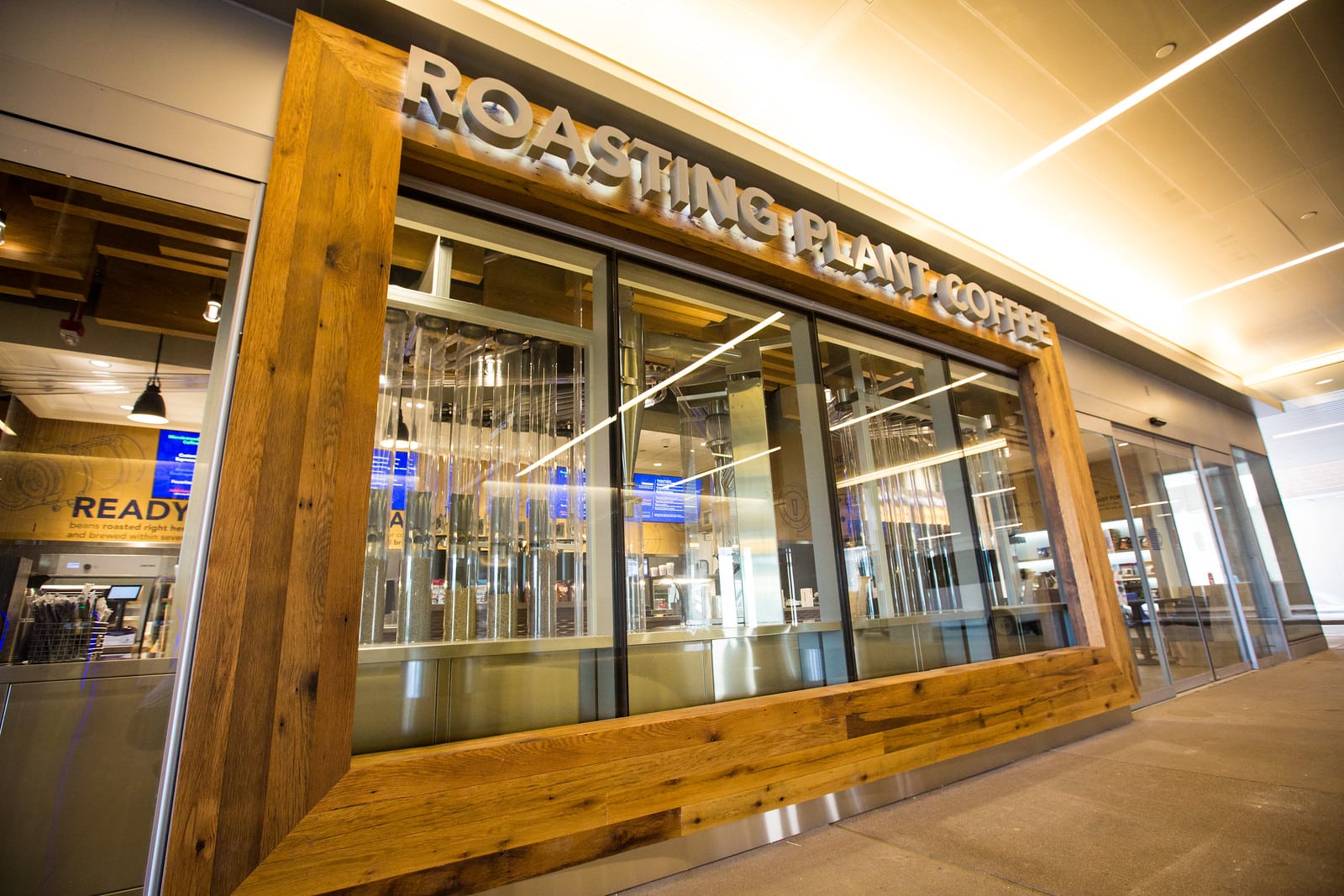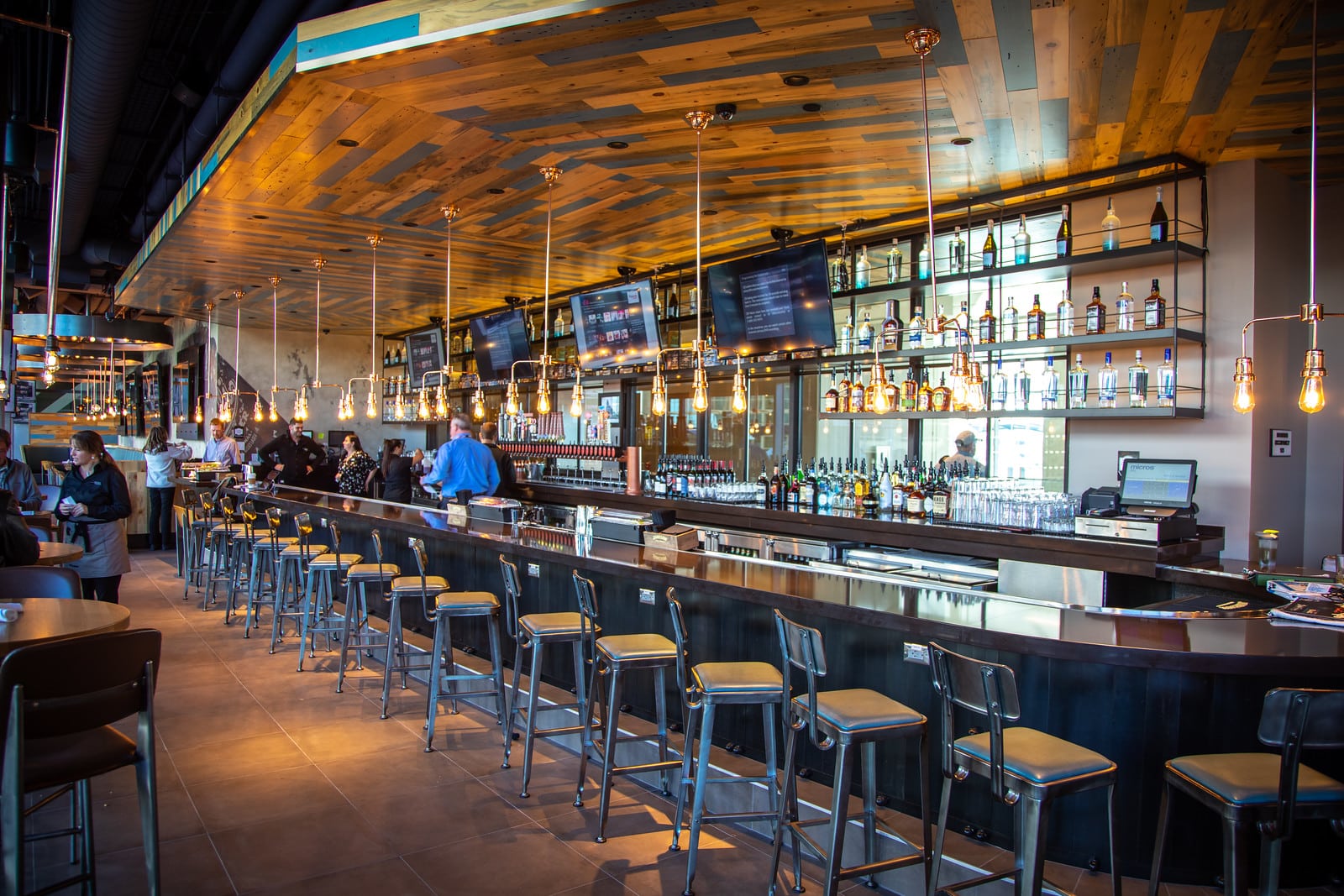
The Roasting Plant, a coffee shop in the Westin Hotel at Denver International Airport, is operated by Midfield Concession Enterprises. (Photos courtesy of Denver International Airport)
For the second time in as many years, the Colorado Supreme Court has told a Denver judge that he was too quick to dismiss allegations of bid-rigging at Denver International Airport.
The high court ruled June 3 that a civil lawsuit must be allowed to move forward in Denver District Court, so that the two sides can collect evidence ahead of a possible trial.
The ruling is a victory for DIA Brewing LLC, which is affiliated with Wynkoop Brewing Co. and the Cherry Cricket restaurant. In 2016, DIA Brewing lost a lucrative restaurant contract at DIA to Michigan-based Midfield Concession Enterprises and then sued in 2018, alleging that Midfield executives bribed DIA Chief Revenue Officer Bhavesh Patel to get the contract.
Patel and the airport have not been charged with crimes and are not defendants in the lawsuit.
Later in 2018, District Court Judge Brian Whitney tossed out the lawsuit. Then, in 2021, the Colorado Supreme Court ruled he was wrong to do so. The case moved ahead until May 1 of this year, when District Court Judge Darryl Shockley tossed the lawsuit out again, claiming it “identifies no factual basis to support this conclusion” of bribery and bid-rigging.
In its ruling last week, the Colorado Supreme Court seemed annoyed that it had to opine on the matter for a second time after it had already determined the lawsuit made clear allegations.
“Although this court believed that its mandate was clear, on remand, notwithstanding this court’s conclusion that the amended complaint properly stated viable claims, several (defendants) filed further motions to dismiss” the lawsuit, the justices wrote.
“The court again expresses no opinion on the ultimate merits of (DIA Brewing)’s claims, as the merits will turn on the development of the evidence as discovery proceeds in this case.”
Stephen Long, an attorney for DIA Brewing, said Monday, “Having filed this case in February of 2018, we are greatly relieved that we now can finally discover and get to the merits of these claims, which involve corruption at DIA.”
The decision is a setback for Midfield Concession Enterprises and its executives, who are defendants in the lawsuit. Midfield operates four locations at DIA: two Smashburger restaurants, a brewpub in the Westin hotel and a coffee bar in the hotel. Its contract runs through 2026.
Two attorneys for Midfield Concession Enterprises did not answer a request for comment.
Last October, two Midfield executives, Samir Mashni and Noureddine “Dean” Hachem, were charged in federal courtwith one count each of mail fraud for allegedly trying to bribe “an appointed executive at a Florida airport” who was working as an FBI informant in Aspen.
Mashni and Hachem have pleaded not guilty. A five-day trial is scheduled to begin Sept. 12.
On May 11, Kevin McGreevy and Richard Tegtmeier, attorneys for Mashni and Hachem, wrote that the case against their clients “follows a 17-month investigation involving extensive investigative resources by the government” and “while the charge in this case is focused on a particular airport in Florida, the investigation is fairly complex in scope and sophistication.”
McGreevy and Tegtmeier added that “the likelihood of resolution of this case short of trial remains strong,” hinting at a possible plea agreement in the next three months.

The Roasting Plant, a coffee shop in the Westin Hotel at Denver International Airport, is operated by Midfield Concession Enterprises. (Photos courtesy of Denver International Airport)
For the second time in as many years, the Colorado Supreme Court has told a Denver judge that he was too quick to dismiss allegations of bid-rigging at Denver International Airport.
The high court ruled June 3 that a civil lawsuit must be allowed to move forward in Denver District Court, so that the two sides can collect evidence ahead of a possible trial.
The ruling is a victory for DIA Brewing LLC, which is affiliated with Wynkoop Brewing Co. and the Cherry Cricket restaurant. In 2016, DIA Brewing lost a lucrative restaurant contract at DIA to Michigan-based Midfield Concession Enterprises and then sued in 2018, alleging that Midfield executives bribed DIA Chief Revenue Officer Bhavesh Patel to get the contract.
Patel and the airport have not been charged with crimes and are not defendants in the lawsuit.
Later in 2018, District Court Judge Brian Whitney tossed out the lawsuit. Then, in 2021, the Colorado Supreme Court ruled he was wrong to do so. The case moved ahead until May 1 of this year, when District Court Judge Darryl Shockley tossed the lawsuit out again, claiming it “identifies no factual basis to support this conclusion” of bribery and bid-rigging.
In its ruling last week, the Colorado Supreme Court seemed annoyed that it had to opine on the matter for a second time after it had already determined the lawsuit made clear allegations.
“Although this court believed that its mandate was clear, on remand, notwithstanding this court’s conclusion that the amended complaint properly stated viable claims, several (defendants) filed further motions to dismiss” the lawsuit, the justices wrote.
“The court again expresses no opinion on the ultimate merits of (DIA Brewing)’s claims, as the merits will turn on the development of the evidence as discovery proceeds in this case.”
Stephen Long, an attorney for DIA Brewing, said Monday, “Having filed this case in February of 2018, we are greatly relieved that we now can finally discover and get to the merits of these claims, which involve corruption at DIA.”
The decision is a setback for Midfield Concession Enterprises and its executives, who are defendants in the lawsuit. Midfield operates four locations at DIA: two Smashburger restaurants, a brewpub in the Westin hotel and a coffee bar in the hotel. Its contract runs through 2026.
Two attorneys for Midfield Concession Enterprises did not answer a request for comment.
Last October, two Midfield executives, Samir Mashni and Noureddine “Dean” Hachem, were charged in federal courtwith one count each of mail fraud for allegedly trying to bribe “an appointed executive at a Florida airport” who was working as an FBI informant in Aspen.
Mashni and Hachem have pleaded not guilty. A five-day trial is scheduled to begin Sept. 12.
On May 11, Kevin McGreevy and Richard Tegtmeier, attorneys for Mashni and Hachem, wrote that the case against their clients “follows a 17-month investigation involving extensive investigative resources by the government” and “while the charge in this case is focused on a particular airport in Florida, the investigation is fairly complex in scope and sophistication.”
McGreevy and Tegtmeier added that “the likelihood of resolution of this case short of trial remains strong,” hinting at a possible plea agreement in the next three months.

